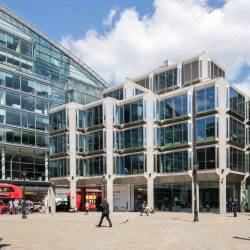To provide the best experiences, we use technologies like cookies to store and/or access device information. Consenting to these technologies will allow us to process data such as browsing behaviour or unique IDs on this site. Not consenting or withdrawing consent, may adversely affect certain features and functions.
The technical storage or access is strictly necessary for the legitimate purpose of enabling the use of a specific service explicitly requested by the subscriber or user, or for the sole purpose of carrying out the transmission of a communication over an electronic communications network.
The technical storage or access is necessary for the legitimate purpose of storing preferences that are not requested by the subscriber or user.
The technical storage or access that is used exclusively for statistical purposes.
The technical storage or access that is used exclusively for anonymous statistical purposes. Without a subpoena, voluntary compliance on the part of your Internet Service Provider, or additional records from a third party, information stored or retrieved for this purpose alone cannot usually be used to identify you.
The technical storage or access is required to create user profiles to send advertising, or to track the user on a website or across several websites for similar marketing purposes.
 Biomarkers for chronic stress are 40 percent higher in women bringing up two children while working full-time than for women with no children, new research suggest. Working from home and other forms of flexible working have no effect on their level of chronic stress – only putting in fewer hours at work helps, says an article in the journal Sociology.
Biomarkers for chronic stress are 40 percent higher in women bringing up two children while working full-time than for women with no children, new research suggest. Working from home and other forms of flexible working have no effect on their level of chronic stress – only putting in fewer hours at work helps, says an article in the journal Sociology.




















 Today is World Mental Health Day and new research from Bupa has found that concerns over mental health is not confined to adults, as a third of employees say they worry about their children’s mental health while at work. The research, conducted among working parents of 4-18 year olds reveals that children’s mental health is among parents’ greatest concerns, on par with physical health and academic performance. The only concern that ranks higher is future financial prospects.
Today is World Mental Health Day and new research from Bupa has found that concerns over mental health is not confined to adults, as a third of employees say they worry about their children’s mental health while at work. The research, conducted among working parents of 4-18 year olds reveals that children’s mental health is among parents’ greatest concerns, on par with physical health and academic performance. The only concern that ranks higher is future financial prospects. 
 Generation Z, the latest generation of workers to enter the workplace (aged 18-24) are social creatures a new report suggests, preferring to work in an office environment, with only 8 percent thinking they work best from home compared to 20 percent nationally. However, putting aside the assumption this is because they’re sharing a cramped flat or living with parents, even within the office environment, the vast majority (81 percent) think social and communal areas are important workplace facilities compared with only 64 percent of all employees and 58 percent of Baby Boomers.
Generation Z, the latest generation of workers to enter the workplace (aged 18-24) are social creatures a new report suggests, preferring to work in an office environment, with only 8 percent thinking they work best from home compared to 20 percent nationally. However, putting aside the assumption this is because they’re sharing a cramped flat or living with parents, even within the office environment, the vast majority (81 percent) think social and communal areas are important workplace facilities compared with only 64 percent of all employees and 58 percent of Baby Boomers. 










December 13, 2018
Flexible working should not mean employers ask people to work all the time
by Oliver Shaw • Comment, Flexible working, Wellbeing
Talking about the role of technology within the flexible working arena is hardly ground-breaking. For decades, technological advancements have been hailed as pivotal to developments within the employment landscape. But this year, conversation appears to have reached another level. In an article for Open Access Government in June 2018, for instance, Richard Morris, UK CEO of International Workplace Group (IWG), explained the extent to which technology-driven shifts have caused significant social change. And in September, HR headlines homed in on a study by Capita and Citrix, which stressed that an inability to quickly introduce new IT services is restricting organisations’ flexibility proposition, and consequently their competitiveness.
(more…)